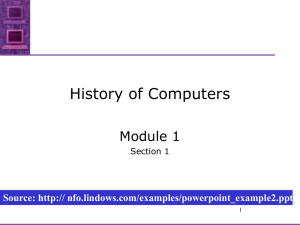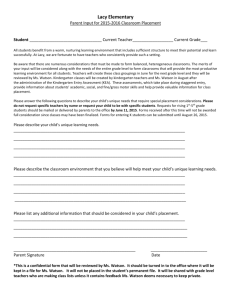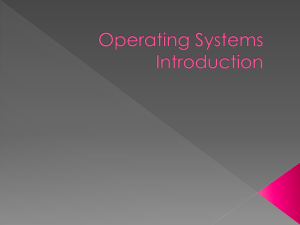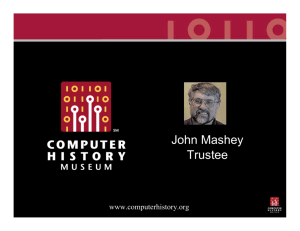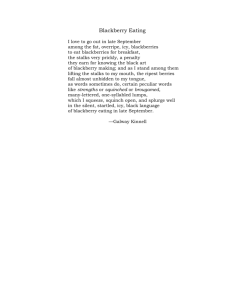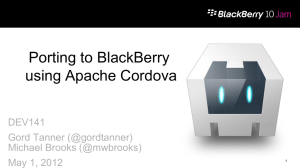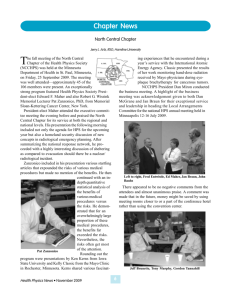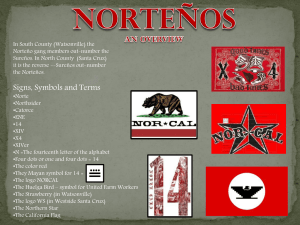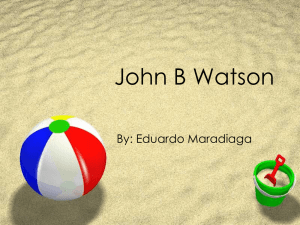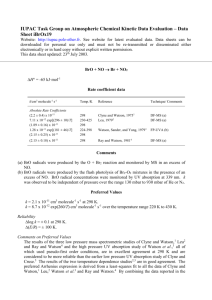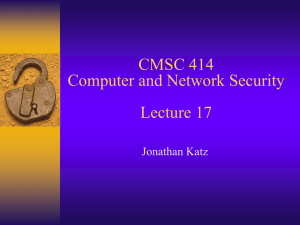ITP 101 Intro to Information Technology
advertisement
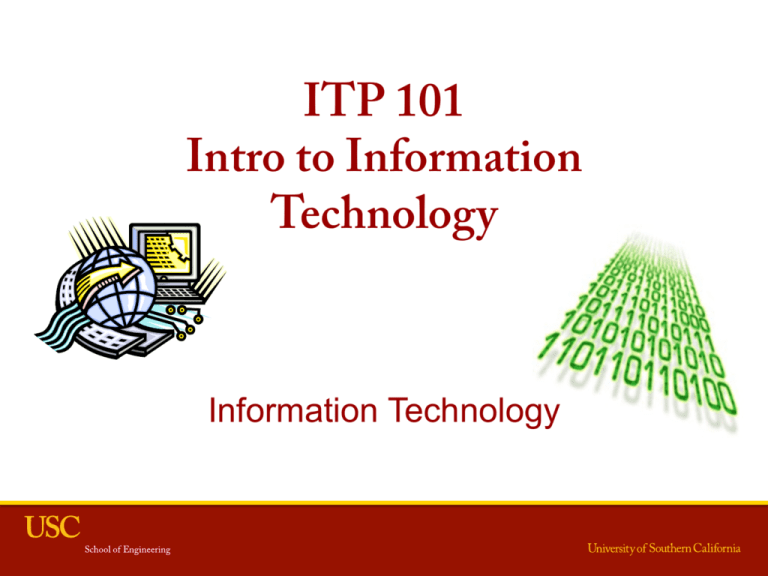
ITP 101 Intro to Information Technology Information Technology Overview • • • • • Information Systems People Software Hardware Data 2 Information System • Group of all networks, computers, and persons involved in the collection, processing, storage, analysis, and dissemination of data and information within a particular environment – Definition is pieced together from various resources • "Computers are everywhere" • A computer is an electronic device that processes data, converting it into information that is useful to people • Any computer is controlled by programmed instructions – Gives the machine a purpose and tells it what to do 3 Information System • 5 components to Information Systems – People – Procedures – Software – Hardware – Data 4 People • Most common point of failure J • Two types of people: – End Users – Everyone else • System Designers • Administrators • Auditors • Management 5 System Software • Operating System – controls all the hardware functionality and provides a platform for executing applications • Personal Computers: – Windows, MacOS, Unix/Linux • Real-Time Operating Systems/Embedded OS – LynxOS, Windows CE – Used for satellites, Laser Printers, etc. • Cell phones: – Palm OS/webOS, BlackBerry (RIM), Windows Mobile, Symbian, Android, and iPhone OS 6 Application Software • Everything you “double-click” on the desktop • Web Browsers • Email Software: – Outlook, Thunderbird, Eudora • Productivity Software: – Examples: MS Word, Excel, PowerPoint • Multimedia Software: – Examples: Adobe Creative Suite • Games 7 Software “Shrink-wrapped” software Custom Applications • Written for a variety of platforms • MS Windows • MS Office, Adobe Creative Suite • Video Games • Typically written for a very customized platform, with very specific hardware requirements • Electronic Medical Records software (EMR) • Enterprise resource planning software (ERP) • Database back-ends • Are digital downloads killing software outlets? 8 Software • Web Applications – Facebook, MySpace – Google Mail, Calendar, Docs – All run through the web browser • Is the web browser the new application platform? 9 Computers – Server Class Supercomputers Mainframes • “Most powerful type of computer” • All custom built • Specialized Tasks • A powerful multi-user computer capable of supporting many hundreds or thousands of users simultaneously • Are prebuilt and customized • Used for processing a lot of data – – – – – Weather forecasting Quantum physics modeling Nuclear physics modeling Cryptanalysis Playing chess – Payroll for McDonalds corporation – Insurance claims for AAA • http://www.top500.org/ • Over 90% of market belongs to IBM 10 Supercomputer Example – Watson • Artificial intelligence computer system capable of answering questions posed in natural language • Built by IBM • Can process 500 gigabytes, the equivalent of a million books per second • With 80 TeraFLOPs, it is currently 98th on the Top 500 Supercomputers list • In 2011, Watson competed on the quiz show Jeopardy! – Watson beat Brad Rutter, the biggest all-time money winner, and Ken Jennings, the record holder for the longest championship streak 11 Computers • Minicomputer – A multi-user computer capable of supporting from 10 to 100s of users simultaneously – Now dead • Workstation – A powerful, single-user computer • Personal computer – A small, single-user computer based on a microprocessor that also has a keyboard for entering data, a monitor for displaying information, and a storage device for saving data – Desktops – Laptops, notebooks 12 More Computers • Hand-held devices – Smartphones – Blackberry, HTC, Samsung, Intel, Motorola, iPhone – Personal Desktop Assistant (PDA), Tablet – Game Boy, Nintendo DS, PlayStation Portable (PSP) • Video game consoles – Nintendo Wii, Xbox 360, PS3 13 Hardware • Electronic components that make computers do wonderful things for us J • Brief breakdown (to be discussed in depth later) – “System Unit” – contains processor and memory – Input/Output (I/O) devices – Secondary Storage – hard drives, floppy, CD/DVD, etc. – Communication devices – modem, network interface card (NIC) 14 Files • Contain information • “Unprocessed data” becomes processed when opened by a particular program • Typical types of files – Documents - .txt .doc .docx .pdf – Worksheets - .xls .xlsx .csv – Database files - .mdb .accdb – Presentations - .key .ppt .pptx – Image files - .gif .jpg .tiff .png – Audio files - .wav .mp3 – Video files - .mpeg .divx .avi – Web files - .htm .html .css 15 Unprocessed vs. Processed Files Google Google 16 History of Computers • Timeline of Computer History – http://www.computerhistory.org/timeline/ • Illustrated History of Computers – http://www.computersciencelab.com/ ComputerHistory/History.htm • Triumph of the Nerds – http://www.pbs.org/nerds/timeline/ • History of Computing Hardware – http://en.wikipedia.org/wiki/ History_of_computing_hardware 17
